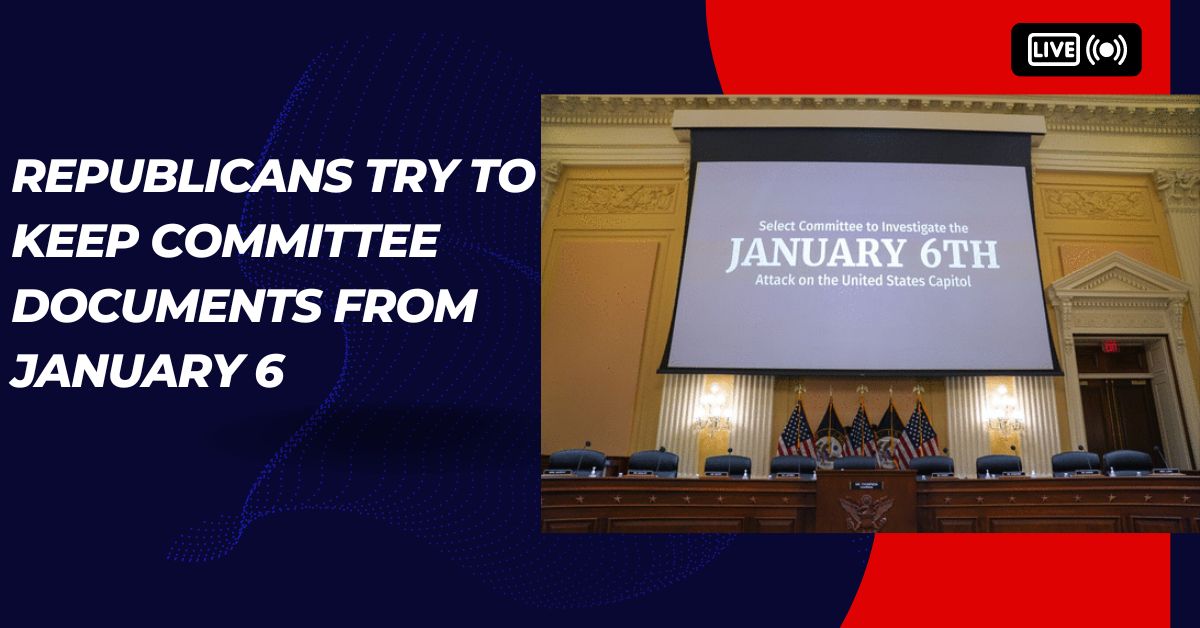Republicans are trying to get a new rule passed in the House that would stop the materials collected by the panel that looked into the uprising on January 6, 2021, from going to the National Archives immediately.
The House committee that looked into the insurrection has released a lot of transcripts and other information to back up its report. However, most of the committee’s basic information will be sent to the National Archives, where it could be locked away for up to 50 years.
But the proposed rules package that the new Congress will vote on Tuesday says that any records made by the panel must instead be sent to the House Committee on House Administration by January 17 and that the National Archives must return any materials it has already received.
The move could mean House Republicans are planning to try to disprove the panel’s investigation, which has been a hot topic for months. The study ended with a criminal referral for former President Trump and a landmark report saying that Trump intentionally misled and angered the insurrectionists in order to stay in power after losing the 2020 election.
Kevin McCarthy (R-Bakersfield), his party’s nominee for speaker of the House, sent a letter to Rep. Bennie Thompson (D-Miss.), who is in charge of the January 6 committee, in November. He asked him to keep “all records collected and transcripts of testimony taken during your investigation.”
“The official Congressional Records do not belong to you or any member but to the American people. They deserve all of the information you gathered, not just the information that fits with your political agenda,” the letter says. House Republican leaders have said they want to find out why it was so easy to get into the Capitol and if the group in charge of the Capitol Police needs to be changed.
House Speaker Nancy Pelosi (D-San Francisco) has already decided that the House Committee on House Administration will be in charge of the records. According to the current rules of the House, the committee has to give the official documents to the House clerk, who sends them to the National Archives. Also, the authorities say that the National Archives can’t give out records from committees for at least 30 years. Before they are made public, sensitive documents, like those from a significant investigation, can be kept for up to 50 years.

Each Congress makes its own rules, but it is unusual for the records of a single committee to be kept instead of sent to the National Archives. Even after committee records have been sent to the National Archives, the House still owns them and can bring them back at any time for official committee use.
In summary, put out by Republicans on the Rules Committee, the proposed change says that “records from the January 6th Select Committee must be quickly sent to the House Administration Committee.” It is unclear if the records will be sent to the National Archives before the new Congress ends in 2024.
Monday, people who work for Republicans on the House Rules Committee and the House Committee on House Administration didn’t answer questions right away. Thompson said in a statement on Monday that the committee’s records are already being sent to the National Archives.
The committee will end its work on Tuesday at 11:59 a.m. Eastern Standard Time. The Government Publishing Office has put hundreds of transcripts of interviews or depositions and thousands of pages of evidence that were used in the report online. This information came out over the weekend, including dozens of transcripts, expert statements, and nearly 400 documents cited in the report that had not been made public before. There are already at least 75 videos in the repository that were shown during the committee’s nine hearings in 2022.
In general, the committee only shared the information in its report. Most of what it put out seems to have been chosen to support the conclusions of its final report and highlight what the committee thought was most important to its investigation. The rest of the information the panel got, often by sending subpoenas to agencies and people, was meant to go to the National Archives.
Emails and text messages that witnesses or federal agencies gave to the committee but were not mentioned in the final report were meant to be sent to the National Archives but were not made public. Raw footage from witness depositions, police video cameras, or documentary filmmakers that wasn’t shown during hearings was also expected to go to the National Archives.
For example, of the hundreds of texts and emails that former White House Chief of Staff Mark Meadows gave the committee, only those mentioned in the report have been made public. Instead of releasing all of the Secret Service or Department of Defense’s records about what they knew about the threats of violence on January 6 or why it took so long for the National Guard to arrive, only the documents mentioned explicitly in the report will be released.
Also, emails, call logs, and other records from inside the White House that the committee got from the National Archives after a lengthy legal battle with former President Trump were expected to be sent back to the Archives unless they were directly mentioned in the report.
During the 18 months that the committee looked into the attack and the political forces that led up to it, they put together the most extensive collection of evidence to date. Researchers did almost 1,200 interviews, but only a tiny number were transcribed and made available through the repository.
Most of the millions of pages of information and evidence that the committee gathered came from subpoenas, long court battles (including one over White House records that the Supreme Court ruled in favor of the committee), or orders from federal agencies.
The committee is thought to have collected a lot more information than what is in the repository. This information is not all in one place or anywhere else. Republicans stopped a nonpartisan, independent commission from being made to study the attack in 2021. This means that no other group is looking into all the factors that led to the attack and how it happened.
The complete interviews and supporting evidence that the committee has released in the last few weeks have given a lot of information and shocking details that aren’t in the final report but help explain more about the people who worked to keep Trump in office even though he lost the 2020 election.
That includes informal advisor Steve Bannon texting his spokeswoman Alexandra Preate on January 8 about a million people surrounding the Capitol after Biden’s inauguration, Trump lawyers planning to sue former Vice President Mike Pence, and Trump’s conversations with his lawyer Rudolph Giuliani, chief of staff Mark Meadows, and Bannon on January 2, right after he asked Georgia Secretary of State Brad Raffensperger to “find” the 11,000 votes Trump needed.
Experts were worried that limiting the information that could be shared would hurt the committee’s goals of holding people accountable and ensuring that the historical record is as accurate as possible. People who have been paying close attention to the hearings, such as journalists and government watchdog groups, have been anxiously waiting to see what basic information the panel would give so they could keep looking into paths the committee didn’t thoroughly look into.
The Department of Justice is also looking into the case, but it’s unlikely that all of its evidence will ever be made public. In December, when the Department of Justice asked for specific information, the committee gave it everything it asked for.
Don’t be shy about sharing your thoughts on this piece below in the comments area. Don’t lose track of what’s new; bookmark this page Journalistpr.com. And check back regularly.

Leave a Reply